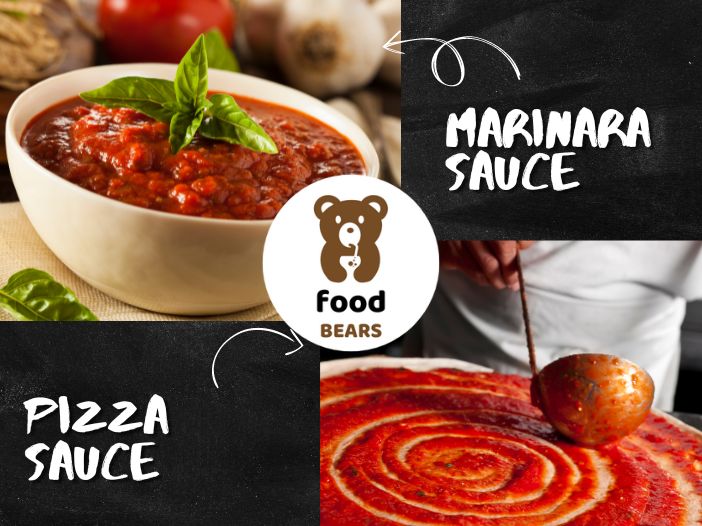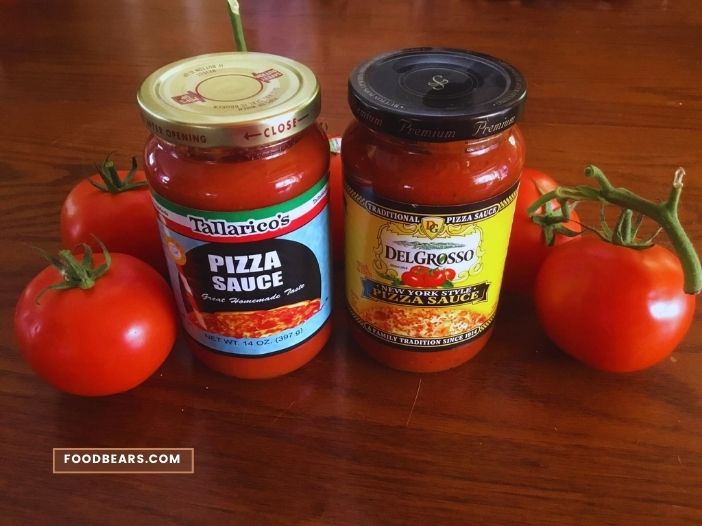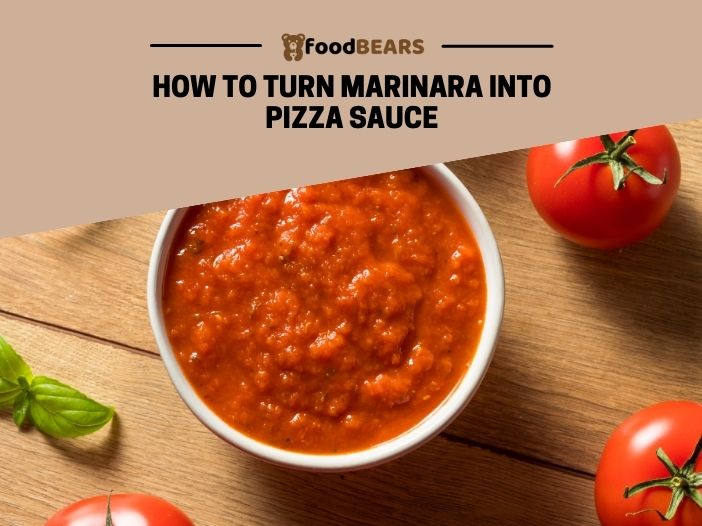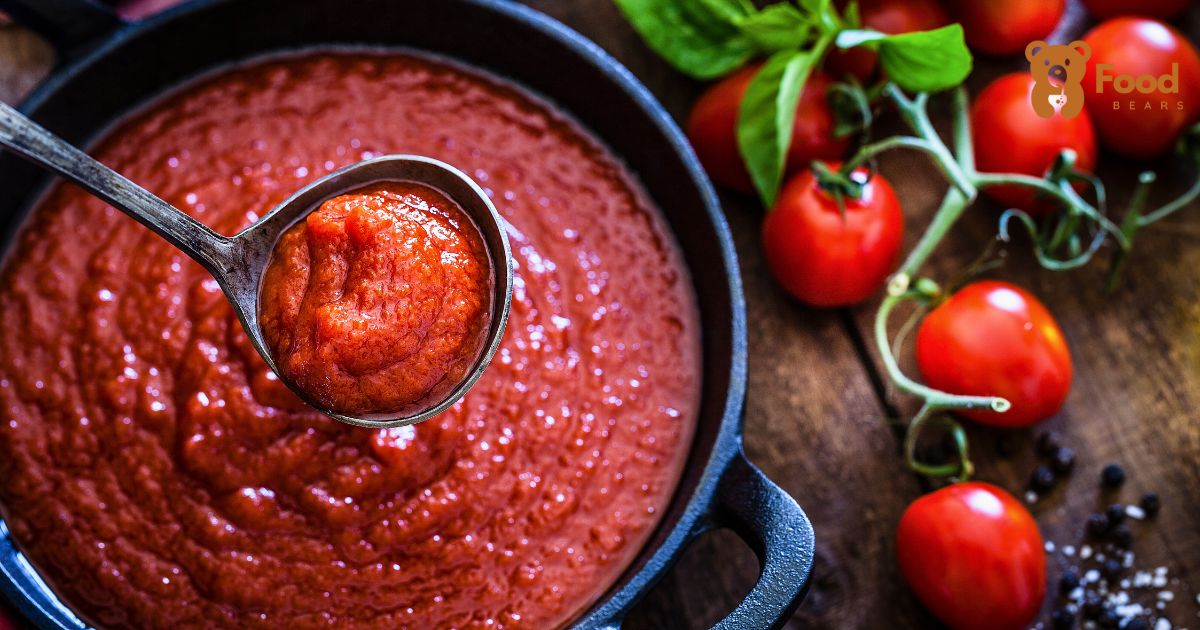To turn marinara into pizza sauce, simply reduce it over low heat until it thickens and intensify the flavor by adding more garlic, oregano, and a bit of sugar.
Imagine you’re ready to make a delicious homemade pizza. You’ve got your gluten-free dough ready, fresh mozzarella cheese, and an array of your favorite toppings.
But there’s one problem – you’ve forgotten the pizza sauce. However, you have a jar of organic marinara sauce, ripe Roma tomatoes, and a can of diced tomatoes. What do you do?
Don’t worry, and you’re not in a pickle. You’re in for a delightful culinary adventure. You can easily transform that marinara sauce into pizza sauce right away. So let’s explore how to turn marinara into pizza sauce.
Understanding the Difference: Marinara vs Pizza Sauce

Marinara and pizza sauce, while similar, have distinct characteristics that set them apart. Both play starring roles in Italian cuisine, but each comes with unique flavors and usage.
First off, let’s talk about origins. Marinara sauce, rich in history, hails from the maritime region of Naples. Its name ‘Marinara,’ ‘sailor-style,’ was introduced by the wives of Neapolitan sailors who whipped up this quick sauce while their husbands were at sea.
On the other hand, Pizza sauce, as you might’ve guessed, was created specifically for pizza. Unlike marinara, pizza sauce has no distinct geographic origin. It’s used worldwide wherever pizzas are made.
The ingredients are a distinguishing factor. While both sauces are tomato-based, their ingredient list paints a different picture. Marinara is more complex.
It often includes tomatoes, onions, garlic, herbs, and sometimes chilli. Pizza sauce, in contrast, is typically simpler, with just tomatoes, a bit of olive oil, and spices like oregano and basil.
Next, let’s examine the texture. Marinara sauce is usually chunkier and more robust. This thickness is because marinara is often cooked with other ingredients like vegetables and seafood.
On the flip side, pizza sauce is smoother, making it easier to spread on pizza dough. It’s generally uncooked before it hits the oven on a pizza, resulting in a rawer tomato flavor.
Let’s not forget about the cooking process, which sets them apart. Marinara sauce is cooked briefly. It allows the flavors to marry together while maintaining the freshness of the tomatoes.
Pizza sauce is usually left uncooked before it’s spread on the pizza dough. This leads to a brighter, more tomato-forward flavor in the final product.
The differences don’t end with taste and texture; usage is another big one. Marinara sauce is versatile. It’s not just used as a pasta sauce. It can be used as a dip, sandwich, or dish base. As you might’ve guessed, pizza sauce is primarily used for pizza.
To sum it up, here is a quick comparison:
| Marinara Sauce | Pizza Sauce | |
|---|---|---|
| Origin | Naples, Italy | Used globally for pizzas |
| Ingredients | Tomatoes, onions, garlic, herbs, chili | Tomatoes, olive oil, spices |
| Texture | Chunkier and robust | Smooth and spreadable |
| Cooking | Briefly cooked | Usually uncooked before baking |
| Usage | Versatile: pasta, dips, sandwiches | Primarily for pizza |
Why Use Marinara as a Base for Pizza Sauce?

Marinara sauce as a base for pizza sauce might seem a bit unconventional. Still, there are several compelling reasons to use marinara as a starting point when creating your pizza sauce.
1. Similar Ingredients
Regarding pizza making, marinara sauce has similar ingredients to traditional pizza sauce. These shared ingredients make marinara an excellent choice as a pizza sauce base. It also promises a familiar and delicious taste.
Here’s why:
- Tomatoes: Both marinara and pizza sauce use tomatoes as their primary ingredient. This similarity ensures a consistent, tangy base that is characteristic of pizzas.
- Garlic and Onions are common ingredients in both sauces. They contribute to a rich and savory flavor profile.
- Herbs: Ingredients like basil, oregano, and thyme are often found in marinara and pizza sauce. Those add depth and complexity to the taste.
- Olive Oil: This is another shared ingredient that lends a smooth texture and distinct flavor to both sauces.
2. Convenience
Pizza making at home is easy but time-consuming. One of the ways to simplify this process is by using marinara sauce as the base for your pizza sauce.
Here’s why it’s a matter of convenience:
It makes your pizza-making experience enjoyable and hassle-free. Using marinara sauce as your pizza base is a convenient shortcut that doesn’t compromise taste.
Using marinara sauce ensures a consistent flavor every time. You don’t have to worry about the taste varying between different batches of homemade sauce.
The store-bought marinara sauce has a long shelf life. You can keep a jar in your pantry and prepare it whenever the pizza craving strikes.
3. Flavor Profile
Marinara sauce as your pizza base can significantly enhance the taste due to its unique flavor profile. It can elevate your homemade pizza, making each bite a flavorful journey. Here’s how:
- Rich Tomato Taste: Marinara sauce uses crushed tomatoes and is known for its robust tomato flavor. This rich, tangy taste forms an excellent base for your pizza. It allows other ingredients to shine without overpowering them.
- Herbaceous Notes: Marinara sauce typically includes Italian herbs like basil and oregano. These herbs add depth to the sauce. They provide a delightful aromatic experience that enhances the overall flavor of your pizza.
- Garlic and Onion Undertones: The presence of minced garlic and onion powder in the marinara sauce adds a savory touch to your pizza. These dried spices contribute to a well-rounded, complex, satisfying flavor profile.
- Balanced Acidity: The acidity in the marinara sauce helps cut through the richness of the cheese and other toppings on your pizza. This balance ensures that no single flavor dominates. So you can taste a harmonious blend of flavors.
4. Thicker Consistency
The consistency of your pizza sauce can significantly impact the final product. The thicker consistency of marinara sauce can improve your homemade pizza’s texture, taste, and overall eating experience.
The thickness of marinara sauce helps toppings stick to your pizza better. This helps to less sliding around and a more enjoyable eating experience. It also contributes to the overall texture of the pizza. It adds a layer of richness that thinner sauces might not provide.
A thicker sauce like marinara creates a barrier between the dough and the toppings. It prevents the dough from becoming soggy. Its thickness allows for even distribution across the pizza base. That ensures your every bite will be flavorful.
5. Versatility
The versatility of marinara sauce makes it an excellent choice for a pizza base. Its well-balanced flavor profile and consistency pair well with various toppings. Here’s why its versatility matters:
- Pairs with Various Toppings: No matter your topping preference, marinara sauce is a great match. It enhances the taste of classic pepperoni and veggie-loaded pizzas alike. Marinara sauce’s flavor is a perfect complement even for those who enjoy unique toppings.
- Suits Different Pizza Styles: Marinara sauce works well with different pizza styles, from thin crust to deep-dish. It wouldn’t overpower the distinct characteristics of any.
- Adaptable to Dietary Needs: Marinara sauce is typically vegan and gluten-free. This quality makes it suitable for various dietary needs. It’s a safe and delicious choice for everyone to enjoy.
- Customizable: While marinara sauce is flavorful, you can customize it easily. Just add a dash of chili or red pepper flakes for heat. Or a sprinkle of extra herbs for more aroma or a touch of sugar for sweetness. Also, use fresh tomatoes for extra raw flavor.
6. Time-Saving
Using marinara sauce as the base for your pizza sauce is a practical, time-saving choice. You can prepare pizza without spending hours in the kitchen. Here’s why it’s a time-saving option:
Marinara sauce is ready to use straight out of the jar. So, it eliminates the need to cook and simmer ingredients for a homemade sauce. With it, you can have your pizza base ready in seconds. Just spread over the pizza, and you’re good to go.
Using marinara sauce means fewer dishes to clean up afterward. You won’t have to deal with pots and pans to make sauce from scratch.
It gives you more time to focus on preparing and arranging your toppings. Because you don’t have to prepare the sauce, that makes your homemade pizza even better.
7. Affordable
Marinara sauce stands out as an affordable and smart choice for your pocket. Here’s why:
- Inexpensive Ingredients: Marinara sauce is made from cost-effective ingredients like tomatoes, garlic, onions, and herbs. These are not only cheap but also widely available.
- Bulk Buying: Preparing Marinara sauce in large quantities allows for bulk ingredients buying. So, you can save significantly.
- Less Waste: You can freeze it and use it as needed. It reduces waste and makes it a cost-effective choice.
- Time is Money: The simplicity and quickness of preparing this sauce save you time. It indirectly contributes to its affordability.
How to Turn Marinara Into Pizza Sauce?

Marinara sauce, with its rich tomato base and a blend of garlic, onions, and herbs, makes an excellent starting point for a pizza sauce. Transforming Marinara sauce into a pizza sauce is a simple process that can be customized to your taste.
Here’s an expanded step-by-step guide based on various sources:
- Thicken the Sauce: If your Marinara sauce is too thin, add some tomato paste to thicken it. Avoid canned ones. Because of its water content, it may make the sauce thinner. Cook the sauce on low heat, and keep stirring until it gets thicker.
- Make it Smoother: If your sauce is chunky, consider pureeing it for a smoother consistency. It will spread evenly over your pizza dough. A smooth sauce ensures every bite of your pizza is bursting with flavor.
- Add Herbs and Spices: Now, let’s talk about flavor. Marinara sauce is delicious on its own, but with a few tweaks, you can elevate it to pizza sauce perfection. Consider adding a bit more oregano. Oregano is a classic pizza sauce herb that can make your sauce pop. You can add basil, also. If you want a spicy kick to your sauce, add 1 teaspoon of chili flakes.
- Include Garlic: Add some garlic powder if your Marinara sauce lacks a garlic kick. For some extra flavor, add the fresh garlic clove.
- Add Olive Oil and Seasonings: Add olive oil and seasonings to your pizza sauce to enhance its flavor. Start with a quality, mild flavor of olive oil. Stir this into your sauce. Then add your preferred seasonings, such as salt, pepper, and Italian herbs. Simmer with the lid the sauce to allow the flavors to meld together beautifully.
- Experiment: Feel free to experiment with the ingredients. Some people prefer a simple sauce with crushed tomatoes, herbs, salt, pepper, and olive oil. Find what works best for you.
Tips for a Perfect Pizza Sauce
Creating the perfect pizza sauce is an art. It can elevate your homemade pizza to new heights. It’s not just about mixing tomatoes and spices; it’s about understanding the balance of flavors and textures. You have to use the right ingredients to achieve your goal.
Here are some of the tips that I do to help you achieve that perfect blend:
- Use Quality Tomatoes: The base of your pizza sauce should be high-quality tomatoes or tomato sauce. If you’re using canned whole tomatoes, ensure they’re of good quality. If they’re too watery, your sauce might end up too thin. Some chefs even recommend hand-crushing the tomatoes for a more authentic texture.
- Add Olive Oil: A bit of extra virgin olive oil can enhance the flavor of your sauce. It also gives your sauce a rich, velvety texture. Some chefs recommend adding a little bruise of fresh basil leaves to the olive oil for an extra layer of flavor.
- Cook Slowly: Allow your sauce to simmer for 45 to 60 minutes. This will help the flavors meld together, reduce the liquid, and thicken the sauce. The slow cooking process also allows the onion in the sauce to soften. It will add a subtle sweetness to the sauce.
- Purée the Sauce: If you prefer a smooth sauce, purée it in a food processor or with a stick blender. This will give a smooth texture to spread evenly on your pizza dough. Add a can of drained diced tomatoes, mushrooms, or peppers if you like chunks in your sauce.
- Balance the Flavors: A pinch of sugar or a bit of honey can be balanced if your sauce is too acidic. Always taste your sauce and adjust the flavors as needed. Some chefs even recommend adding a bit of baking soda to the sauce to lighten its color and reduce acidity.
- Use Wine: A splash of wine can add depth to your sauce. Just make sure to cook it long enough for the alcohol to evaporate. The wine will add subtle complexity to the sauce, elevating your pizza.
How Long Does Marinara Sauce Last, and How Should I Store It?
Marinara sauce, a staple in many kitchens, can be stored for future use if handled correctly. If you can store it properly, its shelf life and delicious flavor will extend.
Here’s a comprehensive guide on how long marinara sauce lasts and how to store it:
- Refrigerator Storage: whether store-bought or homemade, Marinara sauce can last in the refrigerator for about 3-4 days. You must keep it in an airtight container in the fridge for up to 10 days.
- Freezer Storage: For longer storage, freezing is an excellent option. Frozen marinara sauce can maintain its best quality for 2-3 months. But it can last up to 6 months in the freezer.
- Unopened Shelf Life: An unopened jar of marinara sauce can stay at its best quality for about 12 to 18 months. Always check the expiration date on the packaging.
- Tupperware Storage: Plastic containers, such as Tupperware, is a great way to save and store homemade marinara sauce. These containers won’t rip or shatter and hold up well when frozen. They are also stackable, which can immensely help with limited freezer space.
- Freezer Bags: Freezer bags are an inexpensive alternative to plastic containers. They take up less space when you are not using them. They also can flatten out, taking up even less room than plastic containers. However, they should not be used as a temporary solution since the bag can be easily torn when the sauce is still liquid.
- Mason Jars: Mason jars or other sealable glass jars can store homemade marinara sauce. If you’re freezing the sauce in these jars, leave at least an inch of free space near the top of the jar to allow for expansion. You can use this method for temporary storage, meaning 2-3 weeks in the refrigerator.
- Canning: For long-term storage, canning is the most effective method. It can indefinitely lengthen the storage life of your sauces when done correctly. However, canning can be a rather involved process and typically takes time.
Always check your sauce for signs of spoilage like mold, off smell, or change in color before using it. Proper storage will ensure you always have delicious marinara sauce for your culinary creations.
Read more: Keto White Sauce for Pizza
FAQs
Q. Is marinara sauce the same as pizza sauce?
No, they’re not the same. While the marinara sauce and pizza sauce are tomato-based and share some common ingredients, they are not exactly the same.
Marinara sauce has simple ingredients and quick-cooking sauce. It typically includes tomatoes, garlic, onions, and herbs like oregano and basil. It’s cooked on the stovetop, which allows the flavors to meld together.
Pizza sauce, on the other hand, is typically a bit simpler and thicker. It’s often made with tomatoes, garlic, and a few herbs. But unlike marinara, it’s usually not cooked before it’s spread on the pizza crust.
Q. Does marinara sauce taste the same as pizza sauce?
No, they taste different. Marinara has a savory, slightly sweet flavor due to cooked onions and garlic. The herbs used in it also add a fresh, aromatic note.
Pizza sauce, on the other hand, often has a more concentrated tomato sauce flavor. Depending on the recipe, it can also be a bit sweeter. The garlic and herbs can come through more strongly since they’re not mellowed out by cooking.
Q. Can you use the jarred marinara sauce for pizza?
Yes, you can use jarred marinara sauce for pizza. While there are differences between marinara and pizza sauce, you can certainly use jarred marinara sauce on your pizza. It can be a great time-saver and still result in a delicious pizza.
Wrapping Up
And there we have it! The journey of turning marinara into a pizza sauce recipe is not just a culinary hack but a fun and exciting kitchen adventure. You can transform it into a pizza-worthy sauce with tweaking and creativity. It’s all about getting the flavors and consistency spot on.
So, the next time you’re ready to craft a homemade pizza, remember this guide. Your perfect pizza, complete with a sauce you’ve masterfully created, is just a marinara makeover away. Pizza night will never be the same again!
Reference: Discuss Cooking

Ella Foster, co-founder of FoodBears.com, is a skilled writer whose love for cooking fuels her creative work. Her passion for experimenting in the kitchen brings authentic flavor and culinary inspiration to every piece she crafts for the platform.
